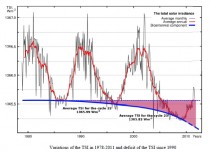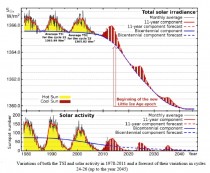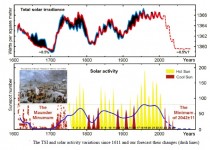Habibullo I. Abdussamatov, Pulkovo Observatory of the RAS
Applied Physics Research Vol. 4, No. 1; February 2012
Abstract
Temporal changes in the power of the longwave radiation of the system Earth-atmosphere emitted to space always lag behind changes in the power of absorbed solar radiation due to slow change of its enthalpy. That is why the debit and credit parts of the average annual energy budget of the terrestrial globe with its air and water envelope are practically always in an unbalanced state.
Average annual balance of the thermal budget of the system Earth-atmosphere during long time period will reliably determine the course and value of both an energy excess accumulated by the Earth or the energy deficit in the thermal budget which, with account for data of the TSI forecast, can define and predict well in advance the direction and amplitude of the forthcoming climate changes.
From the early 1990s we observe bicentennial decrease in both the TSI and the portion of its energy absorbed by the Earth. The Earth as a planet will henceforward have negative balance in the energy budget which will result in the temperature drop in approximately 2014. Due to increase of albedo and decrease of the greenhouse gases atmospheric concentration the absorbed portion of solar energy and the influence of the greenhouse effect It will additionally decline.
The influence of the consecutive chain of feedback effects which can lead to additional drop of temperature will surpass the influence of the TSI decrease. The onset of the deep bicentennial minimum of TSI is expected in 2042plus or minus 11, that of the 19th Little Ice Age in the past 7500 years - in 2055 plus or minus 11.
After the maximum of solar cycle 24, from approximately 2014 we can expect the start of the next bicentennial cycle of deep cooling with a Little Ice Age in 2055 plus or minus 11. Thus, long-term variations of TSI (with account for their direct and secondary, based on feedback effects, influence) are the main fundamental cause of climate changes since variations of the Earth climate is mainly determined by a long-term imbalance between the energy of solar radiation entering the upper layers of the Earth’s atmosphere and the total energy emitted from the Earth back to space.
See full paper PDF.







